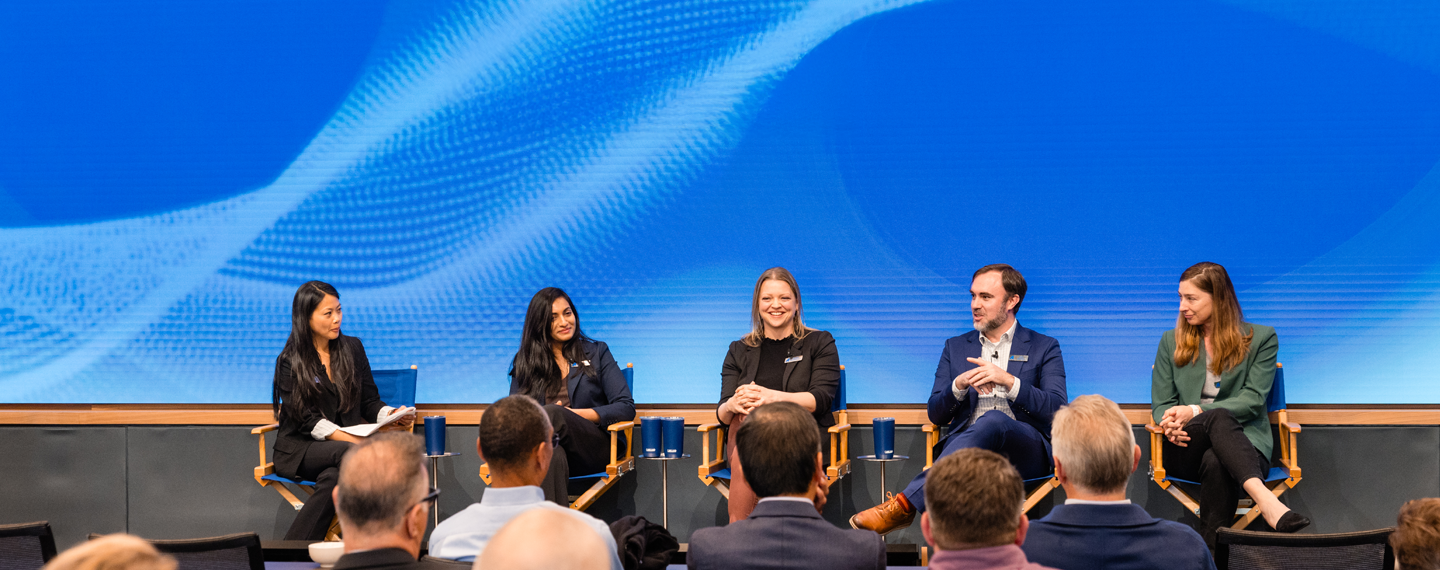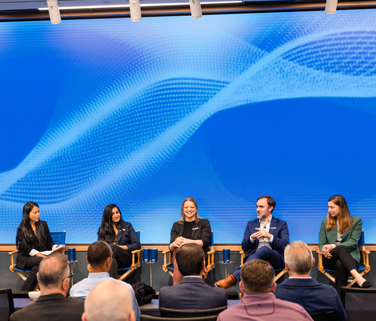Southern California is emerging as a magnet for entrepreneurship in biotechnology and technology, with potential one day to rival established innovation hubs such as South San Francisco and Cambridge, Massachusetts.
To forge new connections among the region’s biotech players, Amgen’s Business Development team invited more than 100 California-based biotechnology and Artificial Intelligence (A.I.) entrepreneurs, venture capital investors, contract manufacturers, and life-science researchers to “Amgen Connect,” the company’s first-ever outreach event for the local biotechnology community.
Held at Amgen’s Thousand Oaks, California headquarters on March 20, the meeting recognized and advanced the shared commitment of participants in Southern California’s life-science ecosystem to serve patients through innovation.
Amgen CEO Bob Bradway opened the meeting, commenting that Amgen has wanted for more than a decade to foster in Ventura County – where the company has its world headquarters –a vibrant local ecosystem of biotechnology-focused start-ups, venture capital firms, and others interested in the life sciences. In recent years, many such firms have set up shop in the area, some because the Conejo Valley is Amgen’s home location.
“I'm thrilled that our dream of creating a biotechnology community in the Conejo Valley [is now coming] to fruition,” Bradway said, adding that he hoped the meeting would be the first in a series of regular “gatherings of local people interested in our industry and the future of innovation.”

Amgen CEO Bob Bradway
Bradway emphasized how helpful it is when local elected officials understand and support biopharmaceutical innovation, noting that such support was key in enabling South San Francisco and Cambridge to emerge as hubs for biotechnology entrepreneurship. “Unfortunately,” he said, “we've seen a lot of the support for what we do erode in those communities over the last couple of decades. I hope we all will feel a sense of responsibility for educating elected officials and policy makers about the value of what we're trying to do together for the benefit of patients.”
“The spirit of this event is to create chemistry locally because we all want to do business and work together with people that we know,” said Rachna Khosla, Amgen’s senior vice president of Business Development and the host of Amgen Connect. “Events like this allow us to come together from different parts of the ecosystem and brainstorm on ideas, talk about the challenges and opportunities that we're seeing as leaders, and cross-pollinate on how we may be able to work together.”

Rachna Khosla, Amgen’s senior vice president of Business Development
A highlight of the meeting was a keynote address by Amgen Chief Technology Officer Dr. David Reese. We have reached a “hinge moment” in tech and biotech, Reese said, citing massive accumulations of genetic and other human data, the rise of new experimental methods such as single cell sequencing, and new analytic tools such as generative A.I., which allow researchers to query and draw insights from vast data sets.
The pace of change in A.I., Reese remarked, has shattered Moore’s Law, which holds that computational power doubles every two years. Large language models are becoming ten to one-hundred-fold more powerful every year, and there’s no sign that the pace of change is slowing.
Reese described the many uses of A.I. across the drug development continuum, from pre-clinical research to product registration. One application of this new technology involves Amgen’s use of generative A.I. to automate the preparation of regulatory dossiers. By training the algorithm on past company filings and FDA guidance documents, Amgen aims to significantly reduce the time needed to prepare a regulatory filing.

Amgen Chief Technology Officer Dr. David Reese
Following Reese’s talk, Amgen’s vice president of Artificial Intelligence and Data Innovation Lab and Partnerships Carlyn Crisostomo moderated a panel discussion among executives from California biotech and technology startups and venture capital firms of how A.I. is transforming drug design and development. Participants included Tharindi Hapuarachchi, vice president of Machine Learning, Platform Strategy, and Operations at Generate:Biomedicines; Becky Pferdehirt, a partner at a16z; Jon Walsh, Founder and vice president of Technology at unlearn; and Peyton Greenside, CEO and Co-Founder of BigHat Biosciences.
The panelists agreed that A.I. is being adopted with remarkable speed and achieving dramatic progress. One cited the example of “Agentic A.I.,” which involves A.I. algorithms that make and act on decisions without the need for human direction. This doesn’t eliminate the role of humans in monitoring and validating the work, but it does allow a company’s human team to be much more productive.
Another panelist noted that A.I. will enable biotechnology innovators to validate vastly more molecules, bring more medicines through clinical development more quickly, and make it economically viable to invest in medicines targeting more diseases.
In closing the meeting, Khosla marveled that although the companies represented on the panel have been in business just five to eight years, they are already on their third waves of innovation. She expressed confidence that the Ventura County-based biotech ecosystem, which just a dozen years ago was in its infancy, will be bigger 18 months from now than it is today.





